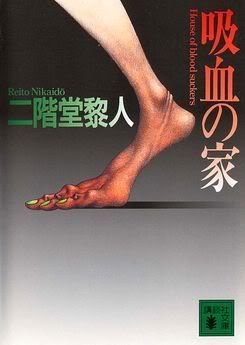 The exorcism of a spirit whose grudge founded a whole family curse calls forth seemingly impossible crimes and forces Nikaidou Ranko to uncover the secrets of the Masamiya family and the fate that is about to befall the three sisters.
The exorcism of a spirit whose grudge founded a whole family curse calls forth seemingly impossible crimes and forces Nikaidou Ranko to uncover the secrets of the Masamiya family and the fate that is about to befall the three sisters.It's difficult to make a Nikaidou novel seem interesting without giving away too much since basically his books are for mere detective fiction entertainment. And he is awesome at that. He does recycle a lot of classic stuff from Carr and motifs like the beautiful sisters typical for Japanese detective fiction (he even mentions works like inugamike no ichizoku himself in his afterword), but he does this skillfully.
In fact kyuuketsu no ie is even more reminiscent of Carr than the other Ranko debut I've read some time ago. It includes one locked room scenario and two murders without footprints of the culprit and at one point in the book Ranko even lectures on the latter. What I've missed in terms of Carr influence was the constant tension which Nikaidou managed to depict in jigoku no kijutsushi, but in my opinion he somehow failed to achieve the same this time. The beginning is absolutely fine and nostalgic, but after the depiction of the murder in the past and Ranko's lecture there is this rather long section which stretches the suspense a bit too much in the middle before the actual murders in the present occur.
Another aspect that reminded me of Carr were the several coincidences in the crime scenarios, but here is what I meant with Nikaidou being skillful: He manages to provide the reader with distinct clues that hint at those coincidences which in turn makes the solution at the end less unexpected and more fair. Furthermore the twists and general revelations at the end of the book wrap the whole thing up in a fairly good story overall with a certain aftertaste that actually made me feel sorry for Ranko. I kind of like this plots who flesh out the dark side of being a genius.
The commentary at the end of the book again reminded me of what I like so much in Japanese detective fiction. Ranko as this witch-like character, located at the edge of chaos and resisting paradigm shifts, eventually explaining everything logically, yet never ruling out the uncanny or even the supernatural sphere completely. Only in Japan did this movement emerge in spite of society's urge to advance scientifically and discard outdated views. And only in Japan did this genre endure until today without an end being in sight. Quite the contrary, it even integrates modernity or science-fiction and corresponding themes since there are so many different authors active in this realm, both in primary and secondary literature, and together they build this whole complex that can be so interesting to explore and study.
Ah, the first book introduced here I actually read XD Indeed a very nice book, I think it was my first Nikaidou.
ReplyDeleteIf only I had time to read more. But with the JLPT coming up and end-of-semester exams, I even had to settle for a simple book for my 現代小説 course, as I doubted I could finish other books in time.
The book in question is 東野圭吾's どちらかが彼女を殺した by the way, infamous for the fact he does not really tell you who killed her.
I'm always asked whether I'll apply for JLPT1 this year, but I don't even know how I managed to pass 2級 last year...
ReplyDeleteI only know 容疑者Xの献身 by 東野圭吾. And only because there's the movie |D I did also find the book afterwards almost for free and could not resist taking it with me but since I already know the basic plot... Oh yes and I saw some 名探偵の掟 episodes.
I settled on reading more 北山猛邦 and 綾辻行人 somewhere between the terror at the end of semester. And if I'm not drowning in secondary literature I'll try to squeeze in more 森博嗣 during my preparations since I'm using him as an example in my bachelor thesis' analysis anyway. Oh yeah and my friends and me have to plan and book our vacation in Japan... *ROTATE*